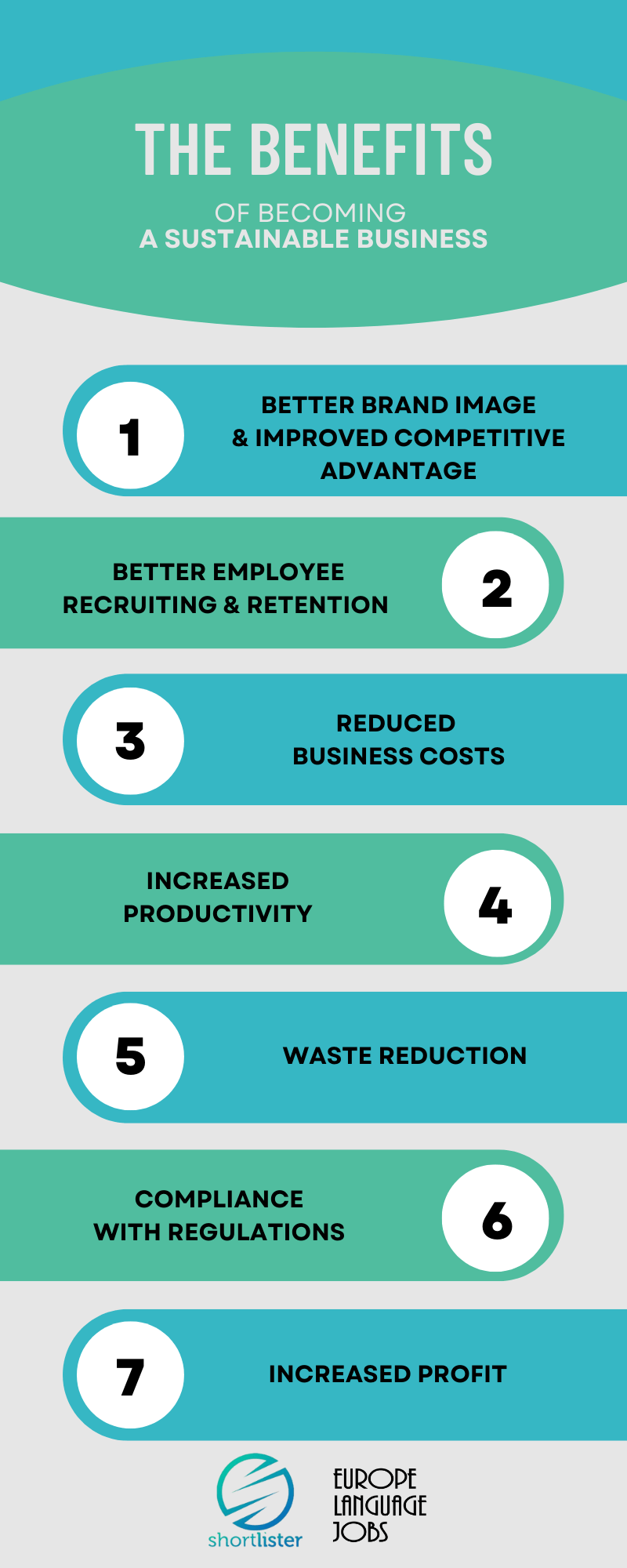While sustainability is still a buzzword, it sure isn’t just a passing trend. Over the years, many companies have been (and still are) finding ways to incorporate sustainable practices within their organizations. This comes as no surprise since many businesses face evident benefits as they become more and more sustainable.
Becoming a sustainable business includes aiming for the triple advantage of sustainability, addressing people, the planet, and profit. Thus, companies should utilize sustainable practices that benefit our planet to mitigate the risk of losing people (employees and customers) and profit.
Therefore, having sustainability as one of the key strategies in the organization can lead to:


1. Better Brand Image & Improved Competitive Advantage
According to a survey by the Natural Marketing Institute, up to 58% of U.S. consumers prefer purchasing goods and services from companies practising sustainable habits. Moreover, consumers choose companies that support their communities.
Today more and more consumers are making their purchasing decisions based on their personal, environmental, and social values. Or, as the BBMG Conscious Consumer Report puts it – 9 in 10 Americans will describe themselves as “conscious consumers.”
Also, these “conscious consumers” are more likely to purchase from companies that produce energy-efficient products, support workers’ rights, promote health and safety benefits and utilize sustainable practices.
This improvement of the brand image through “doing good” is beneficial to companies and employees, their families, consumers, investors, and beyond. However, companies should address sustainability through actions and invest in corporate social responsibility solutions to help them execute their sustainability initiatives.

2. Better Employee Recruiting & Retention
People want to work for companies with a good brand reputation that support corporate environmental and social programs. These positive messages that environmentally conscious companies send can be crucial for attracting talent.
Surveys show that such organizations report better employee satisfaction, increased productivity, and employee loyalty. Hence, a greater talent pool and better retention rate.

3. Reduced Business Costs
Sustainable practices often translate as an overall reduction in operational costs. These include opting for more energy-efficient lighting, investing in more efficient heating and cooling systems, better insulation, and so on. Even though these processes may be more expensive to implement, they are undoubtedly more worthwhile in the long run.

4. Increased Productivity
Not only do sustainable practices reduce costs, but they also contribute to increased employee efficiency and productivity.
Furthermore, making workplaces sustainable and more environmentally friendly helps improve employees’ morale, cognition, and comfort while reducing absenteeism.
Sufficient natural light, good ventilation systems, and plants are some of the common features of green offices that help create a happier, more comfortable work environment that will ultimately improve employees’ output.
Moreover, as one HBR research shows, happy employees are more productive, generate higher sales, and are more creative than other workers.

5. Waste Reduction
There are numerous ways how a company can reduce its waste. Recycling, reducing, and reusing materials, will significantly save resources and prevent waste. Even small habit changes such as printing less can greatly impact both the company and the environment.

6. Compliance with Regulations
By integrating sustainability into the business, companies increase their ability to comply with regulations. Businesses that support sustainable practices are conscious enough to operate without harming the environment.
This means it becomes easier for them to implement the government’s legal requirements to protect the environment and act timely and efficiently.

7. Increased Profit
All the factors, as mentioned earlier, ultimately lead to increased revenue. Reducing the cost, improving brand awareness and reputation, adapting innovative strategies, and attracting employees and investors all contribute to increased profit.
Also, according to a 2007 study by Goldman Sachs, companies incorporating environmental social policies outperformed the general stock market by 25%, and 72% of them had an indisputable advantage over their competitors.
Conclusion
While it may take time, resources, dedication, and commitment to implement sustainable practices in the business, the outcome of it is worthwhile.
High employee productivity, morale, motivation, and increased investment opportunities and revenue distinguish sustainable businesses from competitors.
About the Author:
Tanja Todorovska Malakjan is a content writer at Shortlister. She has experience in writing guest posts, articles, and editorials on various topics. Her fields of interest include wellness, well-being, and HR.














Petre-Cristian Găman1y ago
Amazing article <3
Amazing article <3